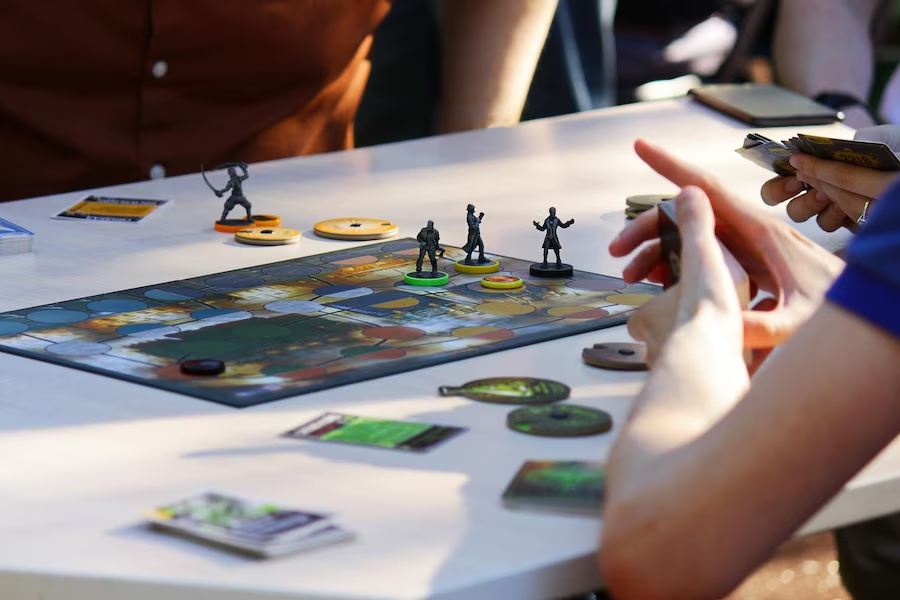
Storytelling games have always been a captivating form of interactive entertainment. These games interweave narrative elements with traditional game dynamics, leading to deeply immersive experiences that foster creativity, social interaction, and critical thinking.
Origins and Evolution of Storytelling Games
The roots of storytelling games can be traced back to oral storytelling traditions, where stories were created and evolved through audience participation. As cultures began to incorporate elements of play into these narratives, the first storytelling games were born. Over centuries, these games have seen remarkable evolution, moving from verbal narratives to written and performative ones, and then to intricate board games and complex digital platforms. The 20th century, in particular, marked a significant milestone in the development of storytelling games, with the creation of the seminal role-playing game, Dungeons & Dragons, in the 1970s.
Classification of Storytelling Games
Despite the vast array of storytelling games available today, they can generally be grouped into three main categories based on their format and mechanics:
- Narrative Board Games: These involve physical components and pre-set narratives that players navigate. They can further be classified based on their cooperative or competitive nature, complexity, and intended audience;
- Role-playing Games (RPGs): These involve players assuming the roles of characters and collaboratively creating narratives. There are several types of RPGs, including tabletop, live-action, and digital;
- Digital Storytelling Games: These are video or online games where players control characters or entire worlds, shaping the narrative along the way. They can be single or multiplayer, and may follow a linear or branching narrative structure.
Benefits of Storytelling Games
Engaging with storytelling games can yield numerous benefits:
- Creativity: Storytelling games stimulate imaginative thinking as players build narratives and solve problems creatively;
- Communication: These games necessitate effective dialogue, negotiation, and sometimes even public speaking, thereby enhancing communication skills;
- Problem-Solving: The unpredictable twists and turns of narratives often require strategic decision-making, honing players’ problem-solving abilities;
- Empathy: Role assumption in storytelling games allows players to view situations from different perspectives, fostering empathy;
- Teamwork: Many storytelling games demand cooperation and collective strategizing, strengthening teamwork skills.
Characteristics of Successful Storytelling Games
To ensure a captivating gaming experience, designers should focus on the following components:
- Engaging Story: A compelling and immersive narrative forms the core of any storytelling game. It must have a strong plot, interesting challenges, and a compelling theme;
- Character Development: Characters are pivotal to driving the story. They must be well-developed, relatable, and dynamic to elicit player investment;
- Game Mechanics and Rules: These should be simple to understand, yet provide enough depth to allow strategic play. The mechanics should also complement the narrative, not detract from it;
- Artwork and Design: Aesthetically appealing and thematic artwork enhances the overall gaming experience and adds an extra layer of immersion;
- Player Agency: Players should have a significant impact on the story’s progression to create a sense of ownership and engagement.
Popular Storytelling Games and Their Key Features
Let’s delve into some of the most popular storytelling games across different categories and examine their unique features:
- Dungeons & Dragons: The undisputed king of RPGs, Dungeons & Dragons (D&D) allows players to embark on epic adventures in a fantasy world. The game’s unique feature is its almost limitless freedom, allowing players to shape their narratives and character development extensively;
- Tales of the Arabian Nights: This board game offers a blend of storytelling and strategy. Players travel through a vibrant world, experiencing countless adventures inspired by the classic tales of the Arabian Nights. The game’s Book of Tales, which contains over 2000 unique encounters, ensures each playthrough is unique;
- The Walking Dead by Telltale Games: This episodic video game series features branching narratives that change based on player choices. It offers an emotional, character-driven experience set in the brutal world of the popular “The Walking Dead” comic book series.
Considerations When Buying a Storytelling Game
When choosing a storytelling game, you should consider the following factors:
- Number of Players: Check the game’s player count. Some games are designed for solo play, while others require larger groups;
- Age Appropriateness: Review the game’s recommended age range. Some games may contain complex rules or mature themes unsuitable for younger players;
- Game Length: Consider the time you are willing to invest. Game durations can vary significantly, from quick 20-minute games to marathon sessions spanning several hours or even multiple sessions;
- Theme and Complexity: Ensure the game’s theme and complexity level align with your interests and abilities.
Conclusion
The realm of storytelling games is as diverse as it is exciting. Whether you prefer classic board games, engaging RPGs, or immersive digital narratives, there’s a storytelling game out there to captivate your imagination. The power of these games lies in their ability to transport us into different worlds, roles, and scenarios, enabling us to craft our narratives and adventures. As players, we become active contributors to the story, shaping it with every decision and action, making each gaming session a unique experience.
FAQ
Yes, many storytelling games offer solo modes. These games often feature rich narratives that make for immersive solo experiences.
Absolutely. Storytelling games can serve as powerful educational tools, helping to enhance language skills, creativity, problem-solving abilities, and social skills.
The length of a storytelling game can vary widely depending on its type and complexity. Some games can be played in under an hour, while others, particularly intricate RPGs or narrative board games, can span multiple hours or even multiple sessions.
Yes, many physical storytelling games have digital versions or adaptations. These digital games often allow for online multiplayer modes, making it easier to play with friends or family remotely.